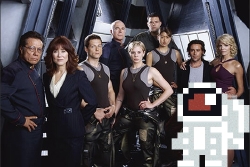 Thanks to Twitter, I found myself vicariously attending GDC this year. Allow me to recount some of the more interesting things I heard people talking about.
Thanks to Twitter, I found myself vicariously attending GDC this year. Allow me to recount some of the more interesting things I heard people talking about.
Anna Anthropy released REDDER, a puzzley explore-and-collect game, free to play on the Newgrounds portal. Unlike When Pigs Fly, her previous effort, the difficultly comes not from its demanding feats of digital dexterity, but rather from the large size of the world, and the things about the world you must learn and remember while you strive to collect the shiny treasures. Give it a try, and block out a couple of hours to play it through if you like it.
One reason why I like Anna's games in particular is the same reason I liked watching the latter-day Battlestar Galactica so much. Ron Moore, BSG's executive producer, took advantage of internet publishing to create and release commentary tracks, in podcast format, almost at the same time the shows aired. They felt less like a producer reminiscing about a past project, and more like lectures about the challenges and strategies of putting an episodic TV show together, spoken by someone who was still in the thick of it.
Similarly, Anna is at least as active in presenting lectures and articles on level design (which we've linked to before) as she is with releasing actual games. Soon after I started When Pigs Fly and saw the grassy turf three screens over from the start, I may have said "heh heh" out loud. I felt that I knew exactly why she put it there, even though it had no explicit in-game effect, and I probably wouldn't have if I hadn't been reading along with her exegetic work.
Ian Bogost gave a presentation at GDC, titled "Play With Us", about how good games connect authors with their audiences in ways also seen in good poetry. He's posted its text and images on his website.
Pound's poem leaves enough room to see the Metro riders as the doleful subjects of labor, or as glistening Venuses amidst the iron.The reader does not "receive" the message of the poem, but excavates its images and uses those to craft relevance.
Excavation.
The relationship of player to game is like that of the archaeologist to the ruin. A game is a remnant of something fashioned and disposed by its creator.
When we play, we excavate.
Jason Roher, best known today for Passage, recently announced his next independently published game, Sleep is Death. This essentially looks like a tool for setting up and game-mastering two-player online storytelling RPGs, with each player sitting at a separate internet-connected computer.
I myself lack the creative muscles to get much out of storytelling games -- that is, light-ruleset role-playing games where the main goal of players and GM (when there is a GM at all) involves telling a story together: more improv theater than dungeon crawl. However, I must treat the timing as quite auspicious, given my recent appeal to the heavens for more experimentation with online multiplayer games. As such, I anticipate the game's release with eager curiosity.
I will be interested to see whether this project appeals to crowds larger than the niche who is already enjoying tabletop storytelling games, including expressly two-player works such as Emily Care Boss's Breaking the Ice. I predict that Sleep is Death won't launch any sort of narrativist-game revolution, but that it will introduce people to that niche who should have been there all along, and just didn't know it yet. To the rest, it will be food for thought. And this will be a net win.
Please do click through the charming and clever demonstration slideshow, which mimics a gameplay session while showing you everything you need to know to get excited about this project (if you're me).
Image credit: Battlestar Galactica publicity still by SyFy; chubby little astronaut art by Anna Anthropy.

